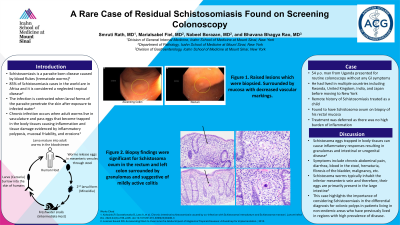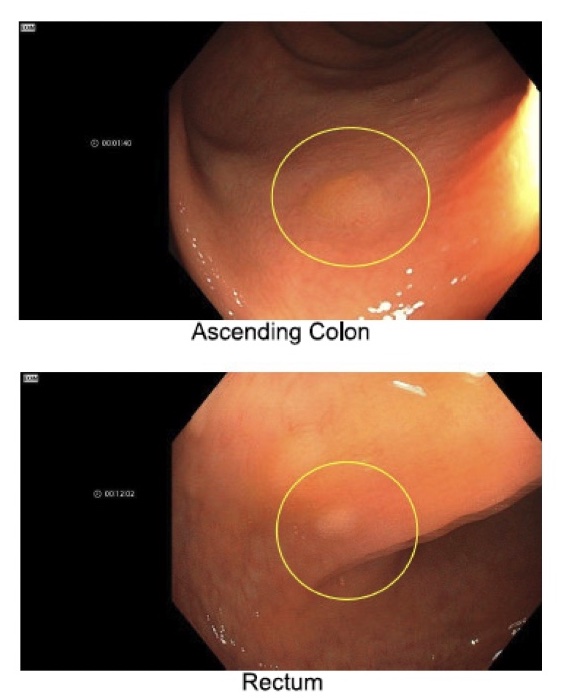Monday Poster Session
Category: General Endoscopy
P2422 - A Rare Case of Residual Schistosomiasis Found on Screening Colonoscopy
Monday, October 28, 2024
10:30 AM - 4:00 PM ET
Location: Exhibit Hall E

Has Audio

Smruthi Rath, MD
Icahn School of Medicine at Mount Sinai
New York, NY
Presenting Author(s)
Smruti Rath, MD, Bhavana B. Rao, MD
Icahn School of Medicine at Mount Sinai, New York, NY
Introduction: Schistosomiasis is an acute and chronic parasitic disease caused by blood flukes (trematode worms) of the genus Schistosoma, with transmission reported in over 78 countries. The mechanism by which schistosomiasis causes symptoms is reported to be due to a granulomatous reaction from trapped eggs interacting with host immunity. An estimated 85% of Schistosomiasis cases in the world are in Africa and it is considered a neglected tropical disease.
Case Description/Methods: We present the case of a 54-year-old man from Uganda who underwent routine screening colonoscopy in New York City. He did not endorse concerns such as diarrhea, abdominal pain, vomiting, hematochezia, melena, or recent weight loss. His background included frequent travel to various countries including Rwanda, United Kingdom, India, and Japan. During his colonoscopy, he was noted to have decreased vascular pattern of the mucosa throughout, and random biopsies were taken from the right and left colon (Figure 1). Additionally, a 1 mm polyp was removed from the ascending colon and three 1 mm polyps were removed in the rectum (Figure 1). Biopsy findings were significant for mildly active colitis with Schistosoma ovum surrounded by granulomas. On further interview with infectious disease doctors, he reported a remote history of Bilharzia diagnosed when he was a child in Northern Uganda and was treated with a five-day course of unknown medication. He also said he received annual stool tests for parasitic infection and no larvae were subsequently detected. Given that he did not have any positive stool tests or a high burden of inflammation, further treatment was deferred, and these findings were thought to be residual chronic infection.
Discussion: Schistosoma infection is contracted when larval forms of the parasite penetrate the skin after exposure to infected water. In the body, adult worms live in vasculature and pass eggs that can leave the body through stool or become trapped in body tissues. These trapped eggs can trigger inflammatory responses resulting in intestinal or urogenital disease. The symptoms of intestinal schistosomiasis include diarrhea, abdominal pain, dyspepsia, and malnutrition. Polyp formation is one of the most frequent intestinal lesions seen in chronic intestinal schistosomiasis and is a consequence of egg deposition in the loose superficial layers of submucosa, triggering cell mediated inflammatory response with granuloma formation to form polyps.

Disclosures:
Smruti Rath, MD, Bhavana B. Rao, MD. P2422 - A Rare Case of Residual Schistosomiasis Found on Screening Colonoscopy, ACG 2024 Annual Scientific Meeting Abstracts. Philadelphia, PA: American College of Gastroenterology.
Icahn School of Medicine at Mount Sinai, New York, NY
Introduction: Schistosomiasis is an acute and chronic parasitic disease caused by blood flukes (trematode worms) of the genus Schistosoma, with transmission reported in over 78 countries. The mechanism by which schistosomiasis causes symptoms is reported to be due to a granulomatous reaction from trapped eggs interacting with host immunity. An estimated 85% of Schistosomiasis cases in the world are in Africa and it is considered a neglected tropical disease.
Case Description/Methods: We present the case of a 54-year-old man from Uganda who underwent routine screening colonoscopy in New York City. He did not endorse concerns such as diarrhea, abdominal pain, vomiting, hematochezia, melena, or recent weight loss. His background included frequent travel to various countries including Rwanda, United Kingdom, India, and Japan. During his colonoscopy, he was noted to have decreased vascular pattern of the mucosa throughout, and random biopsies were taken from the right and left colon (Figure 1). Additionally, a 1 mm polyp was removed from the ascending colon and three 1 mm polyps were removed in the rectum (Figure 1). Biopsy findings were significant for mildly active colitis with Schistosoma ovum surrounded by granulomas. On further interview with infectious disease doctors, he reported a remote history of Bilharzia diagnosed when he was a child in Northern Uganda and was treated with a five-day course of unknown medication. He also said he received annual stool tests for parasitic infection and no larvae were subsequently detected. Given that he did not have any positive stool tests or a high burden of inflammation, further treatment was deferred, and these findings were thought to be residual chronic infection.
Discussion: Schistosoma infection is contracted when larval forms of the parasite penetrate the skin after exposure to infected water. In the body, adult worms live in vasculature and pass eggs that can leave the body through stool or become trapped in body tissues. These trapped eggs can trigger inflammatory responses resulting in intestinal or urogenital disease. The symptoms of intestinal schistosomiasis include diarrhea, abdominal pain, dyspepsia, and malnutrition. Polyp formation is one of the most frequent intestinal lesions seen in chronic intestinal schistosomiasis and is a consequence of egg deposition in the loose superficial layers of submucosa, triggering cell mediated inflammatory response with granuloma formation to form polyps.

Figure: Figure 1. Decreased vascular pattern of the mucosa concerning for colitis and polyps.
Disclosures:
Smruti Rath indicated no relevant financial relationships.
Bhavana Rao indicated no relevant financial relationships.
Smruti Rath, MD, Bhavana B. Rao, MD. P2422 - A Rare Case of Residual Schistosomiasis Found on Screening Colonoscopy, ACG 2024 Annual Scientific Meeting Abstracts. Philadelphia, PA: American College of Gastroenterology.
